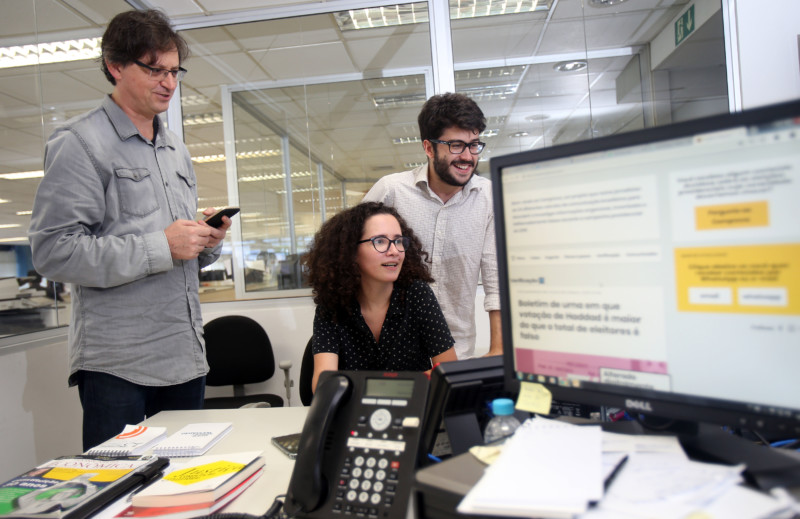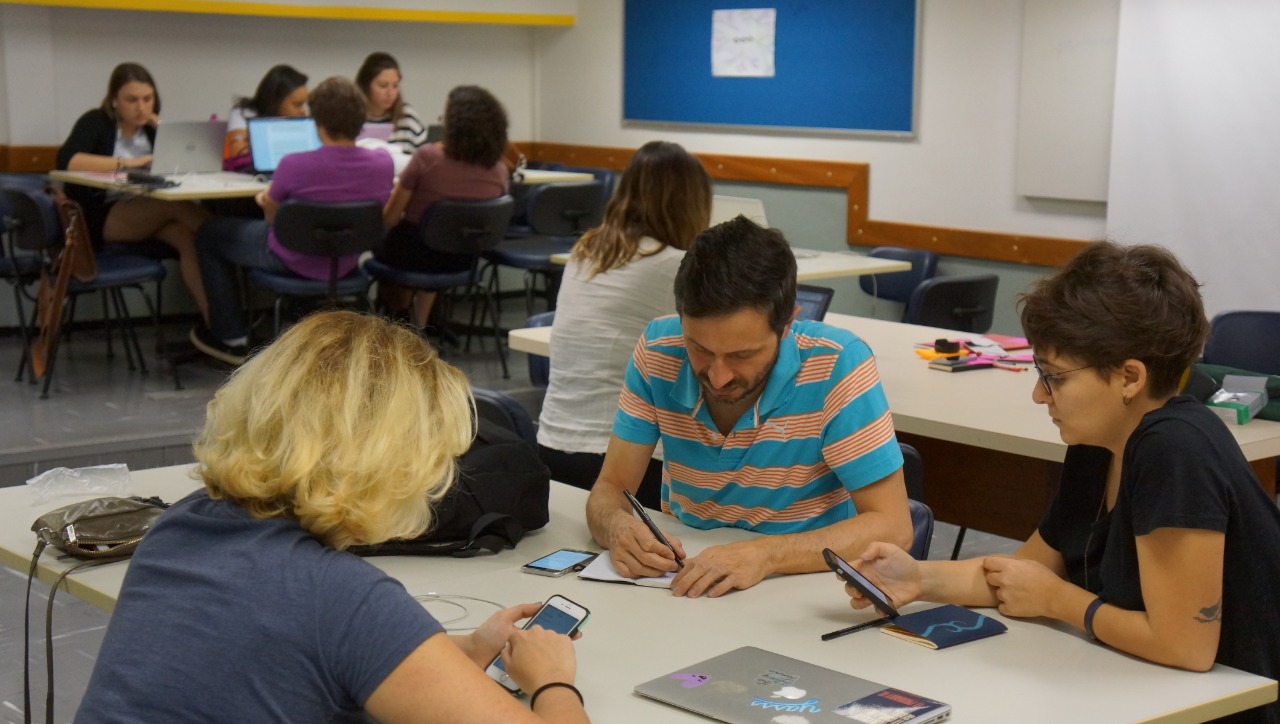Sign up for The Media Today, CJR’s daily newsletter.
On September 6, Jair Bolsonaro, Brazil’s far-right frontrunner for president, was stabbed with a knife, while campaigning at a rally in Juiz de Fora, a city in southeastern Brazil. He survived the near-fatal attack by a man described by police as mentally unstable, and spent a month in Albert Einstein Hospital, in São Paulo, recovering. Weeks later, an audio clip circulated on WhatsApp purporting to show that the incident was pre-planned. On the tape, someone who sounds like Bolsonaro shouts profanity and says he wants to put an end to “this theatrical act.” This audio clip quickly went viral and was viewed nearly 60,000 times on YouTube in the first few days.
On the day of the stabbing, Alessandra Monnerat received more than 600 verification requests asking her about the clip. Monnerat works at Estadão Verifica, a fact-checking initiative at Estadão newspaper in São Paulo. She immediately suspected that the clip was a hoax. But it took nearly three days for Monnerat to gather evidence, with audio forensic experts, to prove that the clip was doctored. Monnerat published the report confirming the clip was a hoax on the website for Comprova, a new fact-checking initiative, and pushed the story to 24 other Brazilian media outlets collaborating with Comprova, including Estadão.
As Brazil faces one of its most consequential elections in recent times, news organizations are battling the same kind of misinformation that has plagued voting in the US and elsewhere. Comprova launched in August to counter fake news shared by Brazilians over social media platforms, including WhatsApp. It is the latest project organized by First Draft, based at the Shorenstein Center on Media, Politics and Public Policy at Harvard, and has a team of journalists who work closely with member newsrooms to to debunk misinformation on social media.
Brazil is gearing up for the second round of elections at the end of this month. Both of the country’s main political parties have been accused of creating fake news stories and exacerbating political polarization, and social media websites are overflowing with misinformation. In July, Facebook took down 196 pages and deactivated 87 accounts that were accused of spreading misinformation. One of the stories that was widely shared this weekend was related to election fraud.
Since the launch of Comprova, whose name means proof in Portuguese, the site has received nearly 47,200 verification requests on its WhatsApp tip line. In the first week, they debunked six stories, which later grew into six stories per day, as they entered the last week of the first round of presidential elections. Monnerat expects the number to swell in the coming weeks as the country prepares to vote in the final round of elections on October 28.
So far, First Draft has launched programs to address fake news in France ahead of the 2017 elections and made similar efforts in the UK and Germany. This is the first time First Draft is using WhatsApp to monitor and discredit fabricated content and is collaborating at such a large scale. It hopes to replicate this model during elections in other nations like India, Nigeria and Indonesia, where WhatsApp dominates.
And while Comprova is unique in Brazil in its focus on WhatsApp, it’s joined in its fact-checking efforts by a number of other organizations, including Publica, Agencia Lupa, and Aos Fatos. While all these agencies are focusing on fact-checking official statements made by politicians, Comprova’s team verifies content that is being shared by citizens on politically motivated WhatsApp groups and Facebook. By having access to a WhatsApp Business API, Comprova’s team can interact and respond to messages in bulk within a short period of time.
WhatsApp, which is owned by Facebook, has nearly 120 million users in Brazil, according to a 2017 study conducted by the Reuters Institute. And in the upcoming elections, a survey shows that nearly 48 percent of Brazilian voters are using WhatsApp to view political content. In Bolsonaro’s case, nearly 57 percent of his supporters are receiving their news on Whatsapp and 61 percent via Facebook.
“Any time you try and say that, This is not true, you have a lot of haters,” Claire Wardle, co-founder and director of First Draft, says, adding that journalists who do the debunking do not receive bylines, to protect them from online attacks.

Daniel Bramatti, Alessandra Monnerat, and Caio Sartori. Photo: José Francisco Diorio/Estadão.
Daniel Bramatti, president of the Brazilian Association of Investigative Journalism (called Abraji), helps run the day-to-day operations of Comprova. The challenge they face with WhatsApp, Bramatti explains, is that people tend to believe everything they receive on their groups because it is a family member or friend sharing news.
“We have seen that a large part of our society doesn’t accept fact-checking or verification because they are prone to believe in the news that confirms their worldview,” Bramatti says.
To disprove misinformation that is going viral, Monnerat says she monitors conversations using Spike, CrowdTangle, and Torabit and alerts her team when she encounters “problematic” stories. Two or three reporters from different newsrooms will then pair up and work to dispel the rumor by cross checking against a set of pre-established questions. Once the verification report is ready, it is vetted by at least two media partners before it goes online and is disseminated across the 24 collaborating media outlets and their social accounts.
Recently, images went viral purporting to show Workers’ Party supporters having sex on the street, she says. A quick reverse image search on Google revealed that those photos were taken 17 years ago, in Australia. “It probably takes them five seconds to create these fake stories. We are up against fighting a very big enemy,” says Monnerat.
The fact that WhatsApp is an encrypted platform has made it difficult for fact-checking websites such as Comprova to penetrate closed-off conversations.
“WhatsApp is unmonitorable and the volume of groups is so high that they [Comprova] can only fight what is relevant,” says Pablo Ortellado, a public policy professor at the University of São Paulo. Ortellado monitors around 200 news websites, 1,000 Facebook pages and 350 WhatsApp groups in Brazil. He considers “fake news as a side effect of the polarization crisis that is impacting Brazil.” He says that unless trust in media institutions is revived and political polarization is resolved, “it is impossible to address the problems related to fake news and hoaxes.”
Even so, Ortellado is optimistic about Comprova’s impact. “The people producing fake news do not have a broadcasting power but Comprova has that,” Ortellado says.
“We know that our role is limited,” Bramatti says. “We are fighting a monster and we don’t have all the weapons to kill it.”
RELATED: As election looms, Brazil braces for fake news
Has America ever needed a media defender more than now? Help us by joining CJR today.



